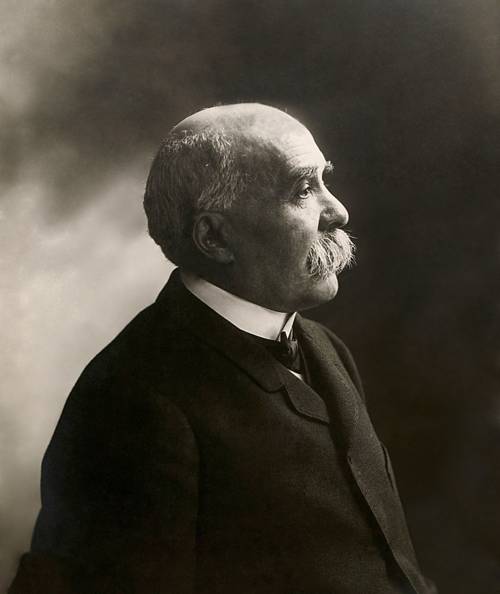
FAQ About Georges Clemenceau

Who was Georges Clemenceau?
Georges Clemenceau was a prominent French statesman and journalist, known for his leadership during World War I and his role in the Paris Peace Conference of 1919. He served as the Prime Minister of France from 1906 to 1909 and again from 1917 to 1920. Renowned for his fiery personality and political acumen, he earned the nickname 'The Tiger' for his tenacity and resolve.

What role did Georges Clemenceau play during World War I?
During World War I, Georges Clemenceau played a crucial role as the Prime Minister of France. He took office in November 1917, during a difficult time for the Allies. Clemenceau focused on restoring France's morale and military power, becoming a critical voice for total victory over Germany. His leadership contributed significantly to sustaining the Allied war effort through to victory in 1918.

Why is Georges Clemenceau nicknamed 'The Tiger'?
Georges Clemenceau earned the nickname 'The Tiger' due to his fierce political style and resolute determination. His aggressive approach in dealing with political opponents, as well as his unwavering commitment to achieving victory in World War I, reinforced this image. The nickname reflects both his tenacity in political battles and his forceful personality.

What was Georges Clemenceau's impact on the Treaty of Versailles?
Clemenceau had a significant impact on the Treaty of Versailles as a key representative of France at the Paris Peace Conference in 1919. He pushed for stringent measures against Germany to ensure French security and was a major advocate for reparations. Clemenceau's demands for strong restrictions on Germany aimed to weaken its military potential and safeguard France from future threats.

What were Clemenceau's views on Germany after World War I?
Georges Clemenceau viewed Germany as a continuing threat to French security following World War I. He advocated for a harsh peace settlement at the Treaty of Versailles, believing that the imposition of stringent reparations and military restrictions were necessary to deter future German aggression. His views were driven by a desire to protect France from any potential resurgence of German militarism.

How did Clemenceau contribute to French politics after World War I?
After World War I, Georges Clemenceau's influence extended to the post-war reconstruction of France. He played a pivotal role in negotiating and implementing the Treaty of Versailles, aiming to secure a stable and peaceful Europe. Although Clemenceau retired from politics in 1920, his policies and leadership during the war had long-lasting effects on French and European political landscapes.

What was Georges Clemenceau's approach during the Paris Peace Conference?
At the Paris Peace Conference, Clemenceau adopted a firm approach, focusing on security and reparations. He sought to impose harsh terms on Germany to prevent future conflicts, insisting on significant territorial concessions and financial reparations. Clemenceau clashed with other leaders, particularly U.S. President Woodrow Wilson, but remained focused on securing France's strategic interests.

When was Georges Clemenceau Prime Minister of France?
Georges Clemenceau served as the Prime Minister of France twice. His first term was from 1906 to 1909, and his second term was from 1917 to 1920, during which he played a crucial role in World War I and the subsequent peace negotiations.

How did Clemenceau influence military strategy during WWI?
As Prime Minister during a critical phase of World War I, Georges Clemenceau had a substantial influence on French military strategy. He advocated for a total war effort, prioritizing resources and morale to maintain the front lines. Clemenceau supported military commanders, allowed them operational freedom, and was instrumental in coordinating with Allied leaders to ensure a unified strategy that led to victory.

What is Georges Clemenceau's legacy in France?
Georges Clemenceau's legacy in France is marked by his steadfast leadership during World War I, his role in shaping the Treaty of Versailles, and his defense of the French Third Republic. Revered as a defender of France during its most challenging times, Clemenceau remains a symbol of determination and resilience in French history.
His influence on post-war policies and international relations also left a lasting impact, with historians recognizing him as a pivotal figure in 20th-century international politics.

Where was Georges Clemenceau born?
Georges Clemenceau was born on September 28, 1841, in Mouilleron-en-Pareds, a small village in the Vendée region of France. His upbringing in rural France shaped his early worldviews and his strong sense of nationalism, which later influenced his political career.

What was Clemenceau's political ideology?
Georges Clemenceau was associated with the Radical Party and held a liberal, secularist, and republican ideology. He strongly advocated for individual liberties, secular education, and anti-clerical policies. Clemenceau's political beliefs were rooted in the defense of the republic and democratic governance, often clashing with conservative and monarchist elements in French society.

How did Georges Clemenceau earn his reputation as a journalist?
Before his prominent political career, Georges Clemenceau established himself as a respected journalist. He founded and wrote for various publications, notably the newspaper La Justice. His journalism was characterized by its investigative nature and critical stance against corrupt governments and ineffective military leadership, often expressing his firm political convictions and helping shape public opinion.

Did Clemenceau have any major conflicts with other Allied leaders?
Yes, during the Paris Peace Conference, Georges Clemenceau had notable disagreements with other Allied leaders, particularly U.S. President Woodrow Wilson and British Prime Minister David Lloyd George. Clemenceau's insistence on harsh measures against Germany for security reasons often clashed with Wilson's more lenient proposals based on self-determination and less punitive reparations.

How did Georges Clemenceau impact the French press?
Clemenceau's influence on the French press was significant, largely through his career as a journalist and editor. He used his journalistic platform to influence public opinion and advocate for political reforms. Clemenceau's fearless and confrontational writing style addressed issues of governmental corruption and societal ills, marking him as a powerful voice in French media.

What were some of Clemenceau's key political achievements?
Georges Clemenceau's key political achievements include his leadership during World War I, securing French victory as Prime Minister, and his significant role in negotiating the Treaty of Versailles. Domestically, he strengthened the Third Republic and implemented policies that advanced secularism and republicanism in France.
He was also instrumental in social reforms and maintaining internal stability during turbulent times, leaving a profound impact on French politics.

How did Clemenceau's early life influence his political career?
Georges Clemenceau's early life in rural France provided him a profound sense of nationalism and respect for the republican ideals. His education and exposure to political and social debates during his formative years shaped his liberal, secular views. The influence of his father, a committed republican, also played a crucial role in Clemenceau's dedication to political and social reform.

Did Clemenceau have any role in French colonial policies?
Georges Clemenceau was generally opposed to colonial expansion, often clashing with pro-colonial lobbyists in France. He viewed colonialism as contrary to the republican values of liberty and human rights. Clemenceau focused more on domestic issues and European affairs, especially after World War I, although his government did continue some colonial undertakings driven by economic and political interests.

What is Georges Clemenceau's connection to the phrase 'Father Victory'?
Georges Clemenceau was often referred to as 'Father Victory' for his leadership during World War I, particularly during its concluding phases. His steadfast commitment to achieving total victory over Germany, along with his dynamic wartime leadership, earned him this affectionate nickname among supporters, symbolizing his role in France's triumph.

How did Clemenceau's political career end?
Georges Clemenceau's political career effectively ended with his defeat in the 1920 presidential election. After leaving the premiership in 1920, Clemenceau retired from active political life, focusing on writing and reflecting on his experiences. Despite stepping back, he continued to influence French public life through his memoirs and writings until his death in 1929.
